Paula Vince's Blog: The Vince Review, page 30
March 24, 2020
'City of Girls' by Elizabeth Gilbert
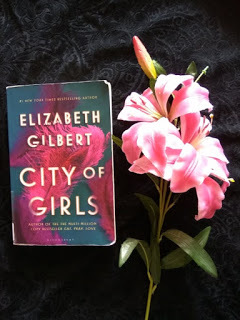
Beloved author Elizabeth Gilbert returns to fiction with a unique love story set in the New York City theater world during the 1940s. Told from the perspective of an older woman as she looks back on her youth with both pleasure and regret (but mostly pleasure), City of Girls explores themes of female sexuality and promiscuity, as well as the idiosyncrasies of true love.
MY THOUGHTS:
I have great respect and admiration for Elizabeth Gilbert's work, especially after reading Big Magic, which is one of my favourite books about forming our creative mindsets to withstand hard knocks. I wasn't as big a fan of Eat, Pray, Love, but did find it interesting and easy to read. I'm sure Gilbert has established herself as one of the significant voices of the 21st century, so when I saw City of Girls at the bookshop I was interested right away but decided to hold off until I could borrow it from the library. Sure enough, it appeared recently for a one week loan, and turns out I was even more riveted than I expected to be from the blurb.
It's the overview of an elderly lady's life, focusing for the first section on the era just prior to and during the second world war, when she was a young woman. Nineteen-year-old Vivian Morris' high achieving parents are embarrassed when she flunks her first year at college, and send her to live for a while with her Aunt Peg, who runs a small theatre company in NYC. Vivian's knack for sewing amazing costumes makes her a favourite of all the actors and showgirls, and she also falls for the city nightlife in a big way.
This turns out to be a stunning epic about a girl who hits rock bottom and can barely hold her head up for shame, let alone figure out how to move beyond it. It's not the sort of false, misplaced shame we all get from taking critical comments and media comparisons on board. It's the huge, overwhelming shame of knowing that you've made a really bad stuff-up, bared for all to see and impossible to excuse. Vivian is a sitting duck for anyone who might cast aspersions at her, because she knows she has absolutely no comeback. We readers know long beforehand that something big is coming, and keep turning pages thinking, 'Oh oh, what does she do?'
After it's over, she's totally demoralised by a person she deeply admires, then wounded by the scathing words of a total stranger. Then in the wake of her big mistake, Vivian discovers one of life's big paradoxes. Sometimes people we pour lots of effort into nurturing relationships with just fall away, even though we may assume they will always have significant roles in our lives. And those who start off as sideliners have the potential to become very meaningful.
I really enjoy Gilbert's prose. Vivian becomes an artist with words as she tells her own story, yet she's still totally believable as the girl who says, 'How many books does a person need to read in order to prove she can read a book?' I guess it takes skillful talent on Gilbert's part to make Vivian both literary genius and rebel dunce rolled in one, but she pulls it off. And gives Vivian a great sense of humour to boot.
The opening hook grabbed me, as it's intended to. It's all meant to be one long letter. Vivian is writing her story for the benefit of a woman named Angela, who has written to finally ask what she meant to her father, since both parents are now dead. Vivian replies that she can't presume to tell Angela what she meant to her father, Frank, but she can certainly tell her what Frank meant to her! And that's what the whole story leads up to. At first it seems that Frank takes a looooong time to appear in Vivian's life, but we eventually understand why his appearance is tied up with all that went before.
Anyone who hates reading sex scenes, and stories about casual sex in general might be totally grossed out by this book! In all honesty, there is probably way too much information at times for all of us. It's not essential to the story, and certainly not the sort of stuff I can imagine Vivian would want to tell Angela! But as for the whole package, it's all about dignity, self-acceptance, looking through people's facades at the common humanity beneath the surface, and life's curveballs looking way different to how we might expect. Oh, and of course the assurance that no matter what we've done, it's possible to not only live it down but become good people in the process. What more can we ask for in a book?
Now I might look out for Elizabeth Gilbert's earlier novel, The Signature of all Things.
Published on March 24, 2020 11:00
March 17, 2020
Mark, Charlotte and Us
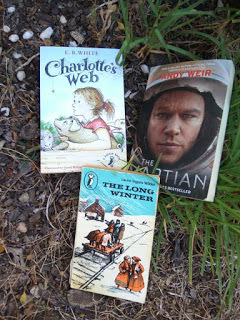
KOVID-19 has entered the world silently and knocked it off kilter within a short length of time. The physical manifestations aren't the focus of this discussion. We in South Australia are possibly among the least statistically affected. I think there have been 20 cases to date as I type, and we are hoping and praying that stricter quarantine of international travelers and more vigilant social isolation will knock this sucker out sooner rather than later.
But I want to talk about the financial repercussions of this beast. My husband is an entertainer who visits nursing homes for his livelihood, so our household has been hit hard. His flourishing business was decimated literally overnight, as every nursing home has cancelled visitors for the foreseeable future. Avoiding a possible over-run on our hospital system must take priority of course, but my word it takes its financial toll on families like ours, who are left overnight in the frightening position of a mortgage and no income. We have to focus solely on practical ways of staying afloat and my head has been spinning like a top and getting nowhere.
This blog is partly about drawing on literary heroes for inspiration, so I settled on an unlikely pair for one thing they share in common. That's their confidence that all will end well, in spite of the dire way things may look. This astronaut and spider are good role models for such hard times. Then I added the true example of a family from the 19th century.
I'll give a quick summary of what they faced themselves.
Nobody would ever choose to be in Mark's shoes. He was assumed dead and abandoned on Mars. Learning to wing it and improvise was necessary to keep himself alive on a barren red planet with no oxygen, food or water. He figured out many creative hacks including the use of his own manure to fertilise potatoes. Several times things looked very dicey. Mark's typical response was, 'This seems very bad, and I know I'll work something out or else I'll die, but I'm not sure what it'll be yet.' And he did pull through, with the help of a mighty roll of duct tape that never seemed to end. (My review is here.)
For Charlotte, it was her best friend's life at stake. Poor Wilbur the young pig discovered that he was destined for the chopping block to be made into ham and bacon. Charlotte promised to save his life, but to Wilbur's agitation, admitted she had no idea how. But Charlotte was a wise spider who knew that necessity is a powerful trigger for creative inspiration. She was so certain she'd figure it out that she refused to lose her composure at all, and even told Wilbur that his histrionics were most unbecoming and annoying. Sure enough, cool and calm won the day, and she figured out an ingenious way to save Wilbur by weaving complimentary phrases about him in her web. (My review is here.)
For more inspiration is the Ingalls family from De Smet. During a scary winter in which a freakishly heavy barrage of back-to-back blizzards prevented the supply train all season, the townsfolk wondered whether they'd freeze or starve first. The only option was to sit at home and try to wait it out, without even the modern luxury of electricity. Pa and Ma got clever, improvising their own alternative sources of heat and light. He twisted hay into hard sticks to replace the scarce coal, and she made button lamps from scraps she had on hand. Perhaps they'd never have thought of these measures if the need had not been so dire. (My review is here.)
I guess we must all call on our inner Mark, Charlotte or Charles and Caroline Ingalls in the days ahead. There is no way of estimating when this is all going to end, which makes it all the more heartbreaking and frustrating for anxious control freaks like me. I just want my husband to be employed again, our elderly citizens to be safe and sound, and the assurance that anyone who needs a hospital bed for whatever reason may be assured of quality care. Oh yeah, and just a little bit of cash flow for groceries and overheads would be nice! But it's looking very much as if faith and creativity will be vital while we're waiting. In the spirit of these two heroes, my motto must be, 'I know we'll get through this, because we have to eat, although I'm not sure how it'll look.'
Are any of you in a similar position to us? Perhaps we could pool creative ideas of staying afloat, if we're all sharing social distancing at home while supplies run short and income dries up. I can't suggest much myself, because I've got nothing yet. But at least we have cool, calm legends to inspire us in anxious times. Hopefully their example will prove to be even more contagious than COVID-19.
Published on March 17, 2020 11:00
March 15, 2020
'Charlotte's Web' by E.B. White
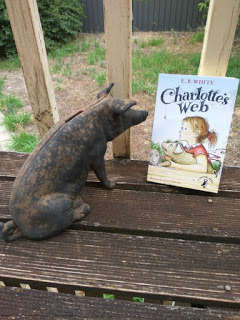
Some Pig. Humble. Radiant. These are the words in Charlotte's Web, high up in Zuckerman's barn. Charlotte's spiderweb tells of her feelings for a little pig named Wilbur, who simply wants a friend. They also express the love of a girl named Fern, who saved Wilbur's life when he was born the runt of his litter.
E. B. White's Newbery Honor Book is a tender novel of friendship, love, life, and death that will continue to be enjoyed by generations to come. This edition contains newly color illustrations by Garth Williams, the acclaimed illustrator of E. B. White's Stuart Little and Laura Ingalls Wilder's Little House series, among many other books.
MY THOUGHTS:
This will go into my 2020 Back to the Classics Challenge for the category with a person's name in the title. The last time I read it was as a 9-year-old behind my classroom desk during silent reading. It all comes rushing back. Wilbur, a tiny piglet who was runt of the litter, is saved from the chopping block by a little girl named Fern. Alas, his luck soon runs out. Fern's father eventually sells Wilbur to his brother-in-law, Homer Zuckerman, who intends to make him into pork sausages and bacon. But Wilbur makes an unlikely alliance with a great brain who intends to save his life. She's a spider named Charlotte.
As is often the case, I enjoyed the story far more this time round. The charisma of the title character won my greatest respect and admiration. Charlotte is an absolute legend who liberates us from negative, menacing impressions that abound about spiders. Who else do we even have in literature to compare her with? There's Aragog and his hungry, ruthless offspring. Or the crafty, 8-legged she-demon Shelob. Even Miss Muffet's inquisitive spider scared little girls silly. I'll rattle off several reasons why I love Charlotte, not only for giving spiders a more positive profile but for encouraging us to be the best versions of ourselves we can.
1) She accepts and defends her essential nature. 'I'm not entirely happy about my diet of flies and bugs, but it's the way I'm made.' At first Wilbur has misgivings about making such a brutal, scheming and bloodthirsty friend, yet he comes to understand that she's actually humane and great for the environment.
2) She encourages us to adopt an orderly, slow pace. 'I'm glad I'm a sedentary spider.' While she lies in wait for what might come, she uses her web as a good place to sit and think, at which she excels. Even with no idea how she'll save her friend Wilbur, she's confident that something will occur to her in good time. I love her motto, 'Never hurry. Never worry.'
3) She motivates friends to become their best selves. Even though Wilbur considers himself an average little porker, he aims to take Charlotte's words about himself, such as radiant, on board. And before long, his spotless white glow begins to shine for all to see. All because of his best friend's words.
4) She's content to stay in the background, satisfied that she's done her best and made a difference to her sphere of influence. If nobody even notices, it doesn't matter one bit. When she knows she's languishing toward the end of her short life, she still spends those moments in peaceful contentment, because she's saved Wilbur's neck.
5) She has a super-descriptive vocabulary, enabling her to make applications with breadth, depth and wisdom. And once again, it's okay if she doesn't get the credit. Using her creativity and skill with words is the main thing, after all. Not being recognised for it.
6) Altogether, she's a real lady. Charlotte is elegant and smart. Quiet industry is second nature to her, and she doesn't get hung up about what others may think of her. For the short time she lives with the gang in the barn, she adds class and contemplation. A perfect role model.
The supporting characters are excellent too. Who could possibly not love Wilbur, and his stout, merry approach to life, reminiscent of Winnie the Pooh? I also sort of dig the sneaky opportunist Templeton the rat, who has no 'milk of rodent kindness' but can be coerced into good deeds if he's convinced they're in his own best interest. He's a super hoarder who proves that even the stinkiest junk may come in handy at times.
All up, this re-visited book from my earliest childhood was more of a page-turner than several other longer and more 'grown-up ones I've read recently. And Garth Williams' awesome illustrations brings the story to life. It's a good weapon in our quest not become like the conventional Mrs Arable, who's alarmed by the merest hint of her daughter's imagination.
Published on March 15, 2020 11:00
March 1, 2020
That Pesky Plot Spoiler
It's the time of year again when students return to Uni, including older ones like myself. After my first week back, I knew I'd be altering the way I post on this blog for the duration of the semester. Much as I love it, I won't be so rigid about keeping a regular book blog that it's like a fourth subject. That would be no good at all.
So I'll be posting roughly fortnightly instead of weekly and even delving deep into my archives for old posts to dust off and tweak, like this one. I'd love to know if you've been told off for this sort of thing, as I have from time to time.

We all know book reviews are way different from plot summaries. Their purpose is to give readers an idea about whether or not they might enjoy a particular book. If we love a book, we want to sing its praises. And if we find ourselves let down, we may want to give others the heads up before they commit. Since they're for people who haven't read the book, giving away too much of the story line is a big no-no. It's generally recommended that nothing which happens after the 50% mark should be written about in great detail. Some say it should be only 25%.
I know some people who are walking, talking plot spoilers (most definitely talking). My husband is King Plot Spoiler. He only needs to mention the name of a story and our nephew has learned to poke his fingers in his ears, shout out, 'LaLaLaLa,' and dash out of the room. My husband is the sort of person who shouldn't write reviews, and thankfully he doesn't.
I make an effort to stick to the 50% guideline when I write reviews, but on rare occasions someone will respond, 'Thanks for the plot spoiler' or some equally snarky comment. It's easy to feel chastened, but I've come to believe that spoiler accidents are a peril that goes with the territory of book reviewing.
It's a problem that seriously bothers some people. I've met several lovely ladies, who are courteous, considerate and understanding in the normal course of a day. Yet if they think they've got the whiff of a plot spoiler, they turn into raging beasts. It's like waving a red flag in the face of a bull. They hurl abuse at the poor reviewer as if she's gone on a killing rampage rather than let a few details about a story slip.
But I believe we would be kind to cut reviewers a bit of slack, if they are genuinely trying hard to do the right thing. Just as chocolate bars come with the warning, 'There may be traces of nuts', perhaps book reviews should have similar disclaimers. 'While great care has been taken to keep this review spoiler free, there may be traces of story line due to the nature of the processing'. I've read a number of articles about the art of writing excellent reviews. Here are some random snippets of advice which might help to prove how murky the waters can get when it comes to making reviews completely uncontaminated.
1) Tell us who your favourite character was, and why.
Well, just say the author planned him to be a red herring. From what we know of him in the first few chapters, he may well be a heartless criminal. And maybe that's exactly what the author intends us to wonder at that stage. Yet if enough reviewers write something like, 'I really loved Alex,' then surely we approach the book with a bit of a spoilerish impression that he'll be sound.
2) Explain why the book made you laugh or cry.
I picked up a novel that seemed set to be a whimsical, light-hearted comedy. Yet a few reviewers had written, 'The ending was absolutely gut-wrenching.' Even though no specific details have been revealed, isn't it still verging on spoilerish when we know from the outset that we have to brace ourselves for something?
3) What was your favourite part of the book?
Here's my warning to reviewers. If it happens to come after the 50% (or even 25%) mark, you should tread very carefully indeed. Don't be fooled by the community of seemingly docile readers. They may well take your vague impressions like a whiff of blood.
If you are trying your best to stick to the rules when you're writing reviews, I wouldn't feel too devastated if somebody accuses you of spreading plot spoilers. Read over it to see if they have a point, then either edit it, delete it, or ignore it. And readers, if you're the sort of people who need a guarantee that everything is completely spoiler free, then maybe you should treat all review forums as a bit of a land mine area and stay out. Or if you do enter, do so at your own risk.
Image courtesy of pixabay
Published on March 01, 2020 16:40
February 19, 2020
'Bleak House' by Charles Dickens
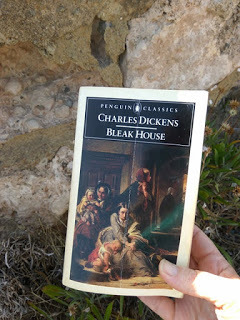
Bleak House opens in the twilight of foggy London, where fog grips the city most densely in the Court of Chancery. The obscure case of Jarndyce and Jarndyce, in which an inheritance is gradually devoured by legal costs, the romance of Esther Summerson and the secrets of her origin, the sleuthing of Detective Inspector Bucket and the fate of Jo the crossing-sweeper, these are some of the lives Dickens invokes to portray London society, rich and poor, as no other novelist has done. Bleak House, in its atmosphere, symbolism and magnificent bleak comedy, is often regarded as the best of Dickens. A 'great Victorian novel', it is so inventive in its competing plots and styles that it eludes interpretation.
MY THOUGHTS:
Here is my choice for a Classic with a Place Name in the Title in the 2020 Back to the Classics Challenge. It's always a pleasure to return to Dickens' London, where fog and mud reign supreme and we know that whenever any character bobs to the surface we're bound to see them again later, possibly under surprising circumstances. He pulls so many divergent threads together, which puts me in awe of his genius when I consider that his long novels were originally published as magazine serials. It means he obviously had it all planned in his head before Issue 1 hit the newsstands.
Dickens' major gripe in this novel is the frustration of court cases that drag on forever, driving some people to put their lives on hold while waiting for a verdict that may have the potential to change everything. The problem is, decisions are so prolonged that successive generations inherit all the angst. It's these non-criminal, inheritance sort of spats that absorb costs to help lawyers feather their nests, but merely break the hearts of the clients concerned and send them bankrupt.
The long-running court case in this story is Jarndyce versus Jarndyce, and the current Mr Jarndyce chooses to stand aloof from all the uncertainty and take three needy young people to live beneath his roof. Richard Carstone and Ada Clare are distant cousins whose interests are also caught up in the court case, and Esther Summerson is a young orphan he invites to keep house for them all. Esther narrates great swathes of the story. Dickens has given us many, many super-sweet, good girls, but she is the only one we are ever allowed into the actual head space of. And she's such a great point of view character!
Esther was brought up by a stern, unloving aunt who taught her that she was born as a disgrace. When Mr Jarndyce becomes her kind benefactor, she's stoked. All of Esther's comparisons are in a positive direction, since she's trained herself to choose gratitude over grumbling every time, and never grows sour or jealous of the bounty of others. She's a perfect example of how mood management should work, and succeeds in setting contentment as her default. The irony is that Esther's existence has been so hush-hushed, since she's the most admirable person in the whole book (with the exception perhaps of the guy she eventually marries.)
An intriguing underlying mystery concerns the identities of Esther's parents. It's easy for the reader to figure both out early on, and then the fun comes from watching it dawn on others as the story unfolds.
There's a very cool cast of characters across the board. It includes freeloaders like old Mr Turveydrop and the parasitic Harold Skimpole, who is surely one of the most despicable leeches in literature. It appears Dickens based his character on a fellow Victorian author, Leigh Hunt, and everyone who knew them both instantly recognised Hunt in Skimpole. The two writers were sort of friendly before Dickens wrote Bleak House, but definitely not afterwards!
There are dysfunctional families like the Jellybys and Smallweeds, and those who have chosen numbness over feeling. The scenes in which Lady Dedlock and her lawyer Mr Tulkinghorn have conversations with huge stakes, yet both apparently try to outdo each other for nonchalance and languidness are very well done. There is so much intense under-reaction from both, the air is charged with it.
This story hasn't knocked Our Mutual Friend and Great Expectations from the top of my Dickens favourites list. I think there's a little too much of poor Richard's plight and Skimpole's dodgy shenanigans for that. But it's well worth a read, especially for the success in which Dickens pulled off a first person female point of view in Esther, who is definitely one of my favourite characters.
Published on February 19, 2020 10:00
February 11, 2020
Guys who were refused, then later accepted!
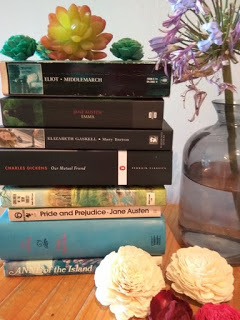
Leading up to this Valentine's Day, I noticed an unusual trend in classic novels. It often occurs that men who propose to the women they love are rejected at first, and then accepted by the same lady down the track. What are we to make of this? I don't think it's meant to encourage guys not to take no for an answer, nor is it to suggest that girls don't know their own minds. The best spin I can think of is that there's always room for hope. True love is shown to be an unpredictable phenomenon, because feelings may be in a state of flux at crucial moments. Fellows, if your romantic dream has been crushed, you're in great company. Take heart from these rejected chaps and hang in there.
Warning: Of course this list contains plot spoilers, so feel free to skip over any you don't wish to know.
1) Fitzwilliam Darcy
What a superb wake-up call for this haughty individual! He tussles with the wisdom of proposing to a girl whose connections are far beneath his, and whose immediate family members are major embarrassments on legs, as far as he's concerned. Then when he finally proposes to Elizabeth Bennett anyway, he tells her his misgivings! And she tells him that he's a proud, pompous prat she'd never consider marrying in a fit! Definitely not the reaction he expected. Luckily for him, she's open-minded enough to regret her own prejudice later, and allow his better nature to work on her.
2) Frederick Wentworth
This poor young sailor proposes to the girl he loves, and who he knows loves him back. But alas, Anne Elliot lets her trusted mentor talk her out of accepting. All he can do is skulk off to sea heartbroken, but little does he know, she's been kicking herself for her foolishness for a decade. He's let a lot of bitterness and resentment strangle his romantic feelings throughout those years, but are his barriers up to the challenge of seeing her again? This is one of my favourite, 'maybe it's not too late,' stories.
3) Gilbert Blythe
He's loved Anne Shirley from the time he was a young boy, and when she rejects his marriage proposal and suggests they just remain friends, he knows the compromise will never work for him. But in this case, it turns out the heroine truly doesn't know her own mind. It seems to be a common failing with Lucy Maud Montgomery's heroines. Gilbert is wise not to latch onto any other admirer on the rebound, and I'd suggest that clueless Anne was luckier still that he didn't.
You may enjoy my Battle of the Book Boyfriends, where I pitted Darcy and Gilbert head to head.
4) Konstantin Levin
What a shemozzle! This shy young farmer draws on every ounce of courage he has to propose to the girl he adores, but his timing is most unfortunate. Kitty Scherbatsky is deeply infatuated with another man, Alexei Vronsky, and tells Levin she can never possibly marry him. Eventually she wakes up to herself, especially when Vronsky jilts her for Anna Karenina. Kitty realises that Levin is indeed the man she truly loves. But our hero has retreated back to his country property with his tail between his legs, resolved never to stick his neck out again. The way in which she prevails on him to have another try makes one of my favourite romances. (See my review.)
5) Edward Beverley
He's the main character of one of my favourite YA classics, Children of the New Forest. Edward proposes to Patience Heatherstone, the daughter of his employer, and she refuses, thinking her father would hate to her marry below their station. However, Superintendent Heatherstone has sussed out his protege's noble birth, and helped orchestrate that proposal. Ooops, it backfires all round, especially for Patience, when Edward rushes off into the army to nurse his broken heart. She has to live up to her name for years, while he decides if he'll ever return to have another crack. (I've reviewed it here.)
6) Fred Vincy
Oh, his girlfriend Mary Garth loves him dearly, but she's far too sensible to accept his first proposal. Fred is an unreliable spendthrift with no desire to buckle down and work, so she's compelled to give him an ultimatum. 'This'll only happen if you shape up.' Fred is so set in his ways, it's tantamount to a refusal. The way in which he makes it happen, aided by Mr Featherstone, who's a sort of rival for Mary's affection, is a touching read. (See my review of Middlemarch.)
7) Gabriel Oak
This humble young shepherd loves his neighbour Bathsheba Everdene very much, but she values her independence and likes him too little to accept his proposal. It takes a disastrous marriage to the feckless Captain Troy, and unfortunate entanglement with intense Farmer Boldwood for her to reconsider her opinion of Gabriel. Only then does Bathsheba realise the value of steadiness and loyalty. It's a great example of hanging in there, and my favourite story by Thomas Hardy.
8) Robert Martin
Perhaps his proposal to Harriet Smith would have been accepted right off, if not for the influence of her friend, Emma Woodhouse. Snobby Emma has decided that no pal of hers will ever settle for a mere farmer, and Harriet is like putty in her hands. Only after a disastrous set-up and another dead-end crush does Harriet realise that her first choice was actually the best. At least the awkward mistakes help her to think for herself. (See my review of Emma.)
9) John Harmon
He's a bit sneaky, because he knows his father made a condition in his will for him to marry Bella Wilfer, and he wants to test her true feelings for him first. So he proposes to her in the guise of a poor man, and Bella instantly knocks him back. She is too familiar with the effects of privation and self-denial, thanks very much. It falls on John to figure out a way to work on her better nature without revealing his true wealth. I had my reservations about this plot thread, but loved the book. (See my review of Our Mutual Friend.)
10) Jem Wilson
Whoa, this is one instant when the heroine refuses a heartfelt proposal, then regrets it the second he steps out the door. Mary Barton faces the stark truth that of course she's in love with Jem, and not flirty Harry the mill owner's son she's been encouraging. Without wanting to admit her blooper outright, she tries more subtle methods to make him try again, but Jem has taken her statement, 'I'll never marry you,' as absolute truth. Shocking circumstances mean that Mary has to prove in a big, big way that she's in love with Jem. (See my review of Mary Barton.)
These are my ten favourite examples, but the list is surely not exhaustive. Are any of your favourites among them, and as always, can you suggest any others?
Published on February 11, 2020 10:00
February 6, 2020
'Hannah Coulter' by Wendell Berry
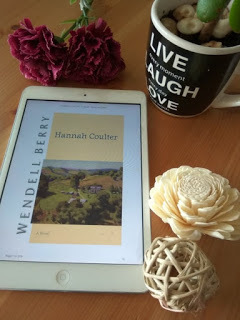
Hannah Coulter is Wendell Berry's seventh novel and his first to employ the voice of a woman character in its telling. Hannah, the now-elderly narrator, recounts the love she has for the land and for her community. She remembers each of her two husbands, and all places and community connections threatened by twentieth-century technologies. At risk is the whole culture of family farming, hope redeemed when her wayward and once lost grandson, Virgil, returns to his rural home place to work the farm.
MY THOUGHTS:
I'd heard plenty of praise about Wendell Berry's pastoral novels set in the quiet American town of Port William, but it's hard to find copies in Australia. So when I came across a kindle version of Hannah Coulter on Amazon, I grabbed it.
I found it lived up to my expectations taken on board from other reviewers. It's a simple story told in flashbacks by an old lady who could easily represent any one of a million senior citizens. Not a lot happens in the way of storyline, yet there are pages of quotes any reader can take to heart from the lessons Hannah learns in the school of hard knocks, and just doing her duty.
The husband of her youth, Virgil Feltner, goes missing in action during World War 2, a matter of months before his baby is born. Hannah deals with her grief, then finds new love with another man. Nathan Coulter, a returned young veteran longing for home, is delighted to begin afresh with Hannah and her little girl, Margaret. Two boys are added to the family unit, as Hannah and Nathan work hard, watch their family grow, then try to support them through their own hard knocks, or deal with their unexpected choices. That's really all there is to it, but it's a dignified and strangely mystical read.
The story presents many cameos of people who were probably similar to our own forebears, living the best they could before passing from this earth. There's Hannah's grandma, a hardworking lady who shaped her granddaughter's life without knowing how it would turn out. Hannah reflects about her early years in retrospect, 'It was a good enough life. After it was over I realised that it was happier than I had known.' It's possible for the perceptive reader to make similar connections about our own lives, while we're still living them.
Male authors who write in first person from female points of view aren't common, and Berry nails Hannah's womanly character. For example, there's this reflection when her daughter, Margaret, is born. 'To know that I was known by a new living being who had not existed until she was made in my body, by my desire, and brought forth in the world by my pain and strength. That changed me.'
It's a book to honour normal, everyday, non-celebrity people. In fact, I suspect celebrities and big-names might even miss the quiet rhythms and simple pleasures in lives such as Hannah's, and ours if we take notice. Because, 'members of Port William aren't trying to get someplace. They think they are someplace.'
Berry's satisfaction in a farming lifestyle is evident, since he's known to be a man of the land and conservationist himself. But my one gripe with the story is that Nathan and Hannah are so stuck in their ways, they're skirting close to regarding their sons as failures, just because they opt not to follow their farming footsteps. Yet Matthew (or Mattie) studies IT and becomes 'CEO of an info processing company whose name is made of letters that don't spell anything' and Caleb chooses to teach agriculture and farming rather than inherit the farm and practice it. I can understand the Coulters' sense of sadness, since they couldn't relate to the tangents their boys' lives took, but there's not much of a sense they were proud of them anyway. Hey, these two were no slouches! A big CEO and a Uni lecturer! I'd be thrilled to settle for that, if these two were my sons.
As I say, I get where Nathan and Hannah were coming from, but if Mattie and Caleb were to call them backwards, narrow-minded old hicks with no idea how the world ticks, well I'd understand where they were coming from too.
Overall, I'm glad I read it, to get the reinforcement that small, forgotten actions are often hugely heroic and big-hearted. Such as Hannah deciding to forgive the stepmother who made her life miserable, and Nathan taking Virgil's daughter Margaret to his heart as his very own, and caring for her so deeply.
By the end, if you're like me you'll have jotted down a patchwork quilt of quotes Hannah has figured out, which could surely just as easily be applied to the rest of us.
'I began to trust the world again, not to give me what I wanted, for I saw that it could not be trusted to do that, but to give unforeseen goods and pleasures that I'd not thought to want.'
Here's one for homebodies. 'The house, its furnishings and surroundings, took on the appearance given it by my ways of work and my liking, and as our work shaped our workplaces, our workplaces shaped our days.' She's talking here about the satisfaction of keeping house, working in the garden and raising chickens.
I'll finish off with this tribute to her neighbours, Danny and Lyda Branch, a salt-of-the-earth type of couple with a big family, always there for the Coulters too. 'They plan and provide as much as they need and take little thought for the morrow. They aren't going places, they aren't getting ready to become anything but what they are, so their lives are not fretful and hankering.' I so want to adopt that as my philosophy, because often whenever I'm stressed and miserable, I can trace it back to some sort of ambition or dream of being different to what I am.
Overall, not an exciting read, but full of nuggets of wisdom for those who can stay awake long enough to look.
Published on February 06, 2020 12:55
January 30, 2020
'The Harp in the South Novels' by Ruth Park
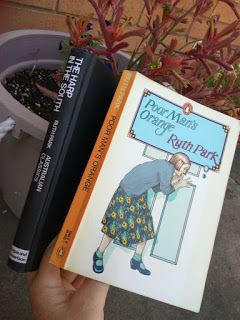
Since it was first published in 1948, this compassionate novel has become a favourite with generations of Australian readers.
The Harp in the South is a nostalgic and moving portrait of the eventful family life of the Darcys of Number Twelve-and-a-Half Plymouth Street in Surry Hills, a Sydney slum. There grow the bitter-sweet first and last loves of Roie Darcy, who becomes a woman too quickly amid the brothels and the razor gangs, the tenements and the sly-grog shops.
Ruth Park is a classic storyteller. In this novel she brings to life a community where, despite the odds, life is always exuberant and full of promise.
MY THOUGHTS:
I can't go past these great novels for the Classic about a Family category of this year's Back to the Classics. I'm talking specifically about Harp in the South and Poor Man's Orange, which were on my English syllabus at High School. They rescued the subject from being a grind and helped me get full marks for my Year 12 exam. Now whenever anybody mentions Australian classics, they spring instantly to mind. It was well and truly time for a summer re-read.
To me, this is the perfect Aussie version of A Tree Grows in Brooklyn. The Darcy family are among the battlers of Irish descent who live in Sydney's Surry Hills in the 1940's. There is no way of eliminating rats, mould and bed bugs without blowing up the whole suburb, and any attempt is like trying to stop a tidal wave with a band-aid. Yet Ruth Park manages to squeeze every bit of beauty possible out of such a sordid setting.
The dad, Hughie, drinks to drown the suspicion that his life is a futile joke. His wife, Mumma, whose Christian name has long been swept aside, manages to keep her loving heart abreast of her rough old world. There was once a little son named Thady, who disappeared without a trace from the front yard when he was six. The two daughters each try in their own way to reconcile their love of romance and truth with their grim environment, and end up realising that to a large extent, they themselves have to be the sensitivity and goodness they seek.
Roie (short for Rowena) is the eldest, and falls for Tommy Mendel, an exotic looking boy with a lame foot and huge chip on his shoulder, and also Charlie Rothe, a tranquil young man who has taught himself to magnify the good that can be found in life. We're told Roie's heart is full of sweet, timid yearning for security, protection and love.
Dolour, the youngest, finds it easy to latch onto uplifting trivia, and has ambitions to excel at school and study her way to a better life. Circumstances, including some serious eye problems, seem to conspire to keep her pinned in her place. In theory those who work hard can surely create the better life they hope for, but Dolour's story helps us question the legitimate truth of that. She is a strong, upright character who really grapples with the fact that a person's background may always stand in the way of their best intentions.
We readers grow to love the Darcy family, and many others who feature in their lives, because it's obvious that Ruth Park is so fond of them herself. The narrator volunteers to do for these Surry Hills dwellers what they can't do for themselves, because they've been denied education and opportunity. That is, she describes their plight eloquently and empathetically. We're told that Roie and Tommy, in their young attraction, 'wanted to say words that were not crude and banal but their imaginations fell flat, unsupported by education and intuition.'
Then later, Hughie lets forth a torrent of self righteous abuse to a man he believes deserves it, but his limited mode of expression does him no favours. The narrator says, 'he didn't have a particularly obscene mind, but the words he used needed adjectival qualifications, so he filled the expressions he knew into the vacant places.' There are many examples of the narrator using her own skill to give the characters a boost, because they simply had no means to.
The bridge between their scruffy, sorry existences and a nobler reality is often provided by those characters who represent their precious Catholic faith. Father Cooley and Sisters Theophilus and Beatrix probably consider themselves hard-working clergy, pouring out their lives as an offering in a rough and thankless neighbourhood. Yet perhaps they never truly realise all their presence means to people like Mrs Darcy and her daughters.
They embody the dignity and beauty of a spiritual world that might be dismissed as mere legend but for their presence. Even though no thanks may be forthcoming, the higher vantage point we get as readers indicates that their sacrifice doesn't fall on barren ground, but is soaked up by people it means the whole world to, giving them a reason to plug on with their own tough lives day after day.
I love these books, notwithstanding some plot jolts we don't foresee which are like kicks in the guts. But romance and loyalty makes us cheer all the louder when they arrive, because they seem that more heroic in such a setting. During a trip to Sydney in recent years, I made sure we drove through Surry Hills especially because of the Darcy family. In the 21st century, it's now the place to be, full of suave, hipster real-estate, and none of those slums. I'd love to see what Hughie, Mumma, Charlie and the girls would make of it.
Published on January 30, 2020 10:00
January 20, 2020
Autobiographical Author/Character Match-ups
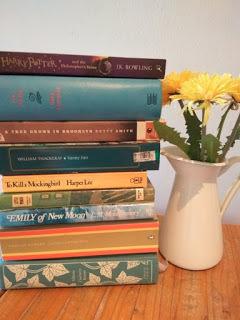
I think most authors roll their eyes whenever they hear the inevitable question, 'Are your characters based on yourself?' The answer is usually a resounding, 'No way!' However, anyone who cares enough to compare the parallels may decide that the question, although a bit trite, is a reasonable one. So much so that the term 'autobiographical fiction' isn't even remotely considered an oxymoron.
So why do they do it? For every straight talking memoirist, there could be dozens of dissembling fiction authors revealing their life stories, but adroitly ascribing them to some made-up alter-ego. My theory is that writers are a private bunch who feel far more comfortable hiding behind the shelter of somebody else. They may retreat at any time with hands up declaring, 'Nope, I never owned that!' Our feelings may prove to be more confrontational, bizarre or brutally frank than we'd care to admit. Transferring them to a make-believe person who can't challenge us on it may be the ideal solution.
So here are ten historical examples of writers who probably opted to stand behind the, 'No, that's not me,' facade, while their friends and acquaintances winked and said, 'If you say so.'
1) Charles Dickens is David Copperfield
This story was Dickens' own personal favourite, which is possibly because of all the meaningful parallels he created between his hero's life and his own. David's working life takes a similar trajectory to Charles', including his earliest stints in law offices to his writing career. The coincidences extend to more delicate issues too. Both Charles and David marry pretty women who turn out to be super childish and offer their husbands no intellectual stimulation, at least in Charles' opinion. When David shares his feelings about his unexpected success in fiction writing, we can rest assured that he's speaking for two men. Their inverted initials, CD and DC were probably no accident either, piling up the evidence that these two were essentially one and the same. (Review is here.)
2) Louisa May Alcott is Jo March
Louisa's publisher had been urging her to write a wholesome book for girls, but she refused for a long time because it didn't interest her. At last she agreed, to get him off her back (and no doubt for the money
Published on January 20, 2020 10:00
January 13, 2020
'Choose your own Adventure' famous classics
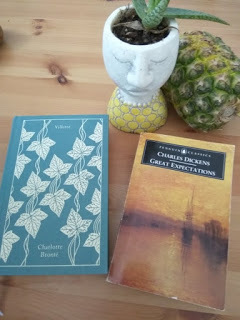
Have you ever wondered what's up with the endings of Great Expectations or Villette? They are both very ambiguous, and you might assume that brilliant authors like Dickens and Bronte could've been clearer, especially so close to the end of their careers. But as it turns out, they were both purposely obscure, so that readers could choose whichever alternative they preferred. Just like the modern Choose your own Adventure books as we know them.
Warning: If you don't like spoilers, read no further. The nature of this discussion makes them inevitable, but I doubt these spoilers will spoil the fun of reading the novels. Here goes.
Great Expectations
If you've read the book and would like a quick recap, here it is. After all that went down in the story, eleven years passed. Pip and Estella accidentally chose the same evening to revisit creepy old Satis House, now a deserted husk. She has been softened by her sorrow. It wasn't easy being married to mean Bentley Drummle. Estella earnestly asks Pip to consider her his friend, even though they're about to part ways again. As they stroll out of the gates together, he reflects to himself that he 'sees no shadow of further parting from her.' And then it ends. Is that sentence enough for us to assume they get married, or is Pip still jumping to conclusions as he did in their youth? If Dickens was still alive, I'd be among those fans requesting more information.

Wait, there is more though. The afterword at the back of my novel told me that he'd once written a completely different ending, and a Google search confirmed it. In Dickens' original draft, Estella had married a country doctor after her disastrous marriage to Drummle. One day, she happened to encounter Pip on the street before they went their separate ways. And Pip thought, 'She looks pleasanter than she used to. Perhaps time has softened her attitude.'
That ending is a bit anti-climactic, and Dickens was talked into changing it. He went to stay a few nights with his good friend Edward Bulwer-Lytton, who was also a well-known Victorian novelist. Dickens showed him the rough draft, and Bulwer-Lytton complained that the ending would be far too disappointing for fans after all they'd been through with Pip. So Dickens scribbled out the last few pages and re-wrote them. He posted Bulwer-Lytton the new ending to see if he approved. It evidently got the nod, because it's the ending we have now.
Yet we still don't know for sure. Did they marry or not? I think Dickens was telling his friend in effect, 'I've worked it so everyone'll be happy. Sentimentalists like you can cling to the hope that Pip and Estella do tie the knot. But at the same time, realists and pragmatists don't have to buy into it, if they choose not to.'
 I think Edward Bulwer-Lytton was the real hero of this true anecdote. Off the topic, a bit more research on him shows that we owe this guy more than you might think. He turns out to be one of those writers we often quote without even knowing it. The phrase, 'the pen is mightier than the sword,' was first coined by Bulwer-Lytton, although I might have guessed Shakespeare. He also came up with 'in pursuit of the almighty dollar' and 'dweller on the threshold.' But perhaps his biggest claim to fame might be his immortal opening line, 'It was a dark and stormy night.' He might have been happy enough to let his ownership of that one slip into obscurity :)
I think Edward Bulwer-Lytton was the real hero of this true anecdote. Off the topic, a bit more research on him shows that we owe this guy more than you might think. He turns out to be one of those writers we often quote without even knowing it. The phrase, 'the pen is mightier than the sword,' was first coined by Bulwer-Lytton, although I might have guessed Shakespeare. He also came up with 'in pursuit of the almighty dollar' and 'dweller on the threshold.' But perhaps his biggest claim to fame might be his immortal opening line, 'It was a dark and stormy night.' He might have been happy enough to let his ownership of that one slip into obscurity :)Here's my review of Great Expectations.
I've also written this rave about Pip.
Villette
The ambiguity is compressed into the last page, but here's a recap of the lead-up. After providing heroine Lucy Snowe with her own little school and making her independent, the hero Paul Emanuel has been overseas taking care of business. Lucy, who loves him with all her heart, awaits his return. But the weather across the sea turns nasty, and she prays hard for his safety. A wild south-west storm whips through and doesn't cease until 'the Atlantic is strewn with wrecks.' That's the end. But wait, it doesn't mention whether or not Paul's ship was among the casualties. What game is Charlotte Bronte playing here?
A bit of research indicates that the ending was clear in her gloomy mind all along. Monsieur Paul perished, naturally. It seems Charlotte designed Lucy's life to be a sort of carbon copy of her own, and since she was feeling fruitless, tragic and unfulfilled at the time of writing, there was no way she'd let Lucy off easy. In addition, an early chapter about Lucy's former employer Miss Marchmont could be a foreshadow. The lonely old dame's backstory includes the death of her beloved fiance in a freak accident, which was possibly meant to be a prophecy of Lucy's fate.
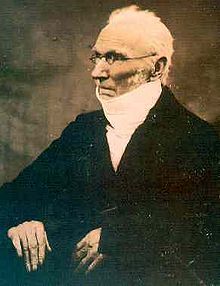 But Charlotte Bronte read the manuscript to her old Dad, and he objected. The Reverend Patrick Bronte insisted on a happier ending than the drowning of Monsieur Paul. It was hardly fair on soft-hearted readers like himself. Not to mention super-abrupt. So like a dutiful daughter, Charlotte didn't change her own plan but re-worked the ending to be more ambiguous. The glossary in my edition puts it this way. 'While keeping to the ending she'd imagined, she made it more metaphoric in order to allow Monsieur Paul's survival for those who needed a sunnier ending.'
But Charlotte Bronte read the manuscript to her old Dad, and he objected. The Reverend Patrick Bronte insisted on a happier ending than the drowning of Monsieur Paul. It was hardly fair on soft-hearted readers like himself. Not to mention super-abrupt. So like a dutiful daughter, Charlotte didn't change her own plan but re-worked the ending to be more ambiguous. The glossary in my edition puts it this way. 'While keeping to the ending she'd imagined, she made it more metaphoric in order to allow Monsieur Paul's survival for those who needed a sunnier ending.'I love this excerpt Charlotte wrote in a letter to her publisher too.
'With regard to the momentous point - Monsieur Paul's fate - in case anyone in future should request to be enlightened thereon, they may be told that it was designed that every reader should settle the catastrophe for himself, according to the quality of his disposition... Drowning and matrimony are the fearful alternatives. The merciful will of course choose the former and milder doom, drown him to put him out of pain. The cruel-hearted will on the contrary pitilessly impale him on the second horn of the dilemma, marrying him without ruth or compunction to that person, that individual, Lucy Snowe!'
Here's my review of Villette.
Do Pip and Estella get married?
Does Monsieur Paul perish or survive?
I watched a Great Expectations Netflix series that clearly went for the marriage option, but I wasn't a big Estella fan, and think Pip could do far better. Although, he was a bit of a duffer throughout the book, he didn't deserve the fate of winning her hand. Sure, she was manipulated and exploited by her unscrupulous guardian, yet she'll always be a mean girl to me.
As for Villette, I'm disturbed by the number of contemporary readers who talk about Paul's death as a given! Come on people, the Reverend Pat gave us a loophole, and I'm going to take it. I was totally invested in their relationship, so of course he returns to Lucy!
So where do you stand?
Published on January 13, 2020 17:35
The Vince Review
Author, blogger, reader, reviewer, mother of three. All this goes under the mantle of 'stay at home mum'. I also love walking and cooking when the mood strikes me. Getting stuck into a good book has a
Author, blogger, reader, reviewer, mother of three. All this goes under the mantle of 'stay at home mum'. I also love walking and cooking when the mood strikes me. Getting stuck into a good book has always been one of the best things ever.
I invite you to treat this blog like a book-finder. People often ask the question, "What should I read next?" I've done it myself. I try to read widely, so hopefully you will find something that will strike a chord with you. The impressions that good books make deserve to be shared.
I read contemporary, historical and fantasy genres. You'll find plenty of Christian books, but also some good ones from the wider market. I also read a bit of non-fiction to fill that gap between fiction, when I don't want to get straight on with a new story as the characters of the last are still playing so vividly in my head. ...more
I invite you to treat this blog like a book-finder. People often ask the question, "What should I read next?" I've done it myself. I try to read widely, so hopefully you will find something that will strike a chord with you. The impressions that good books make deserve to be shared.
I read contemporary, historical and fantasy genres. You'll find plenty of Christian books, but also some good ones from the wider market. I also read a bit of non-fiction to fill that gap between fiction, when I don't want to get straight on with a new story as the characters of the last are still playing so vividly in my head. ...more
- Paula Vince's profile
- 108 followers



